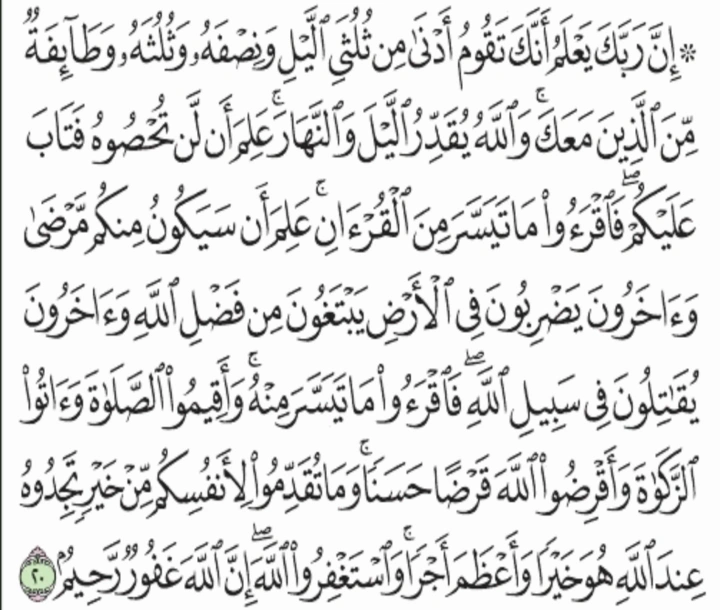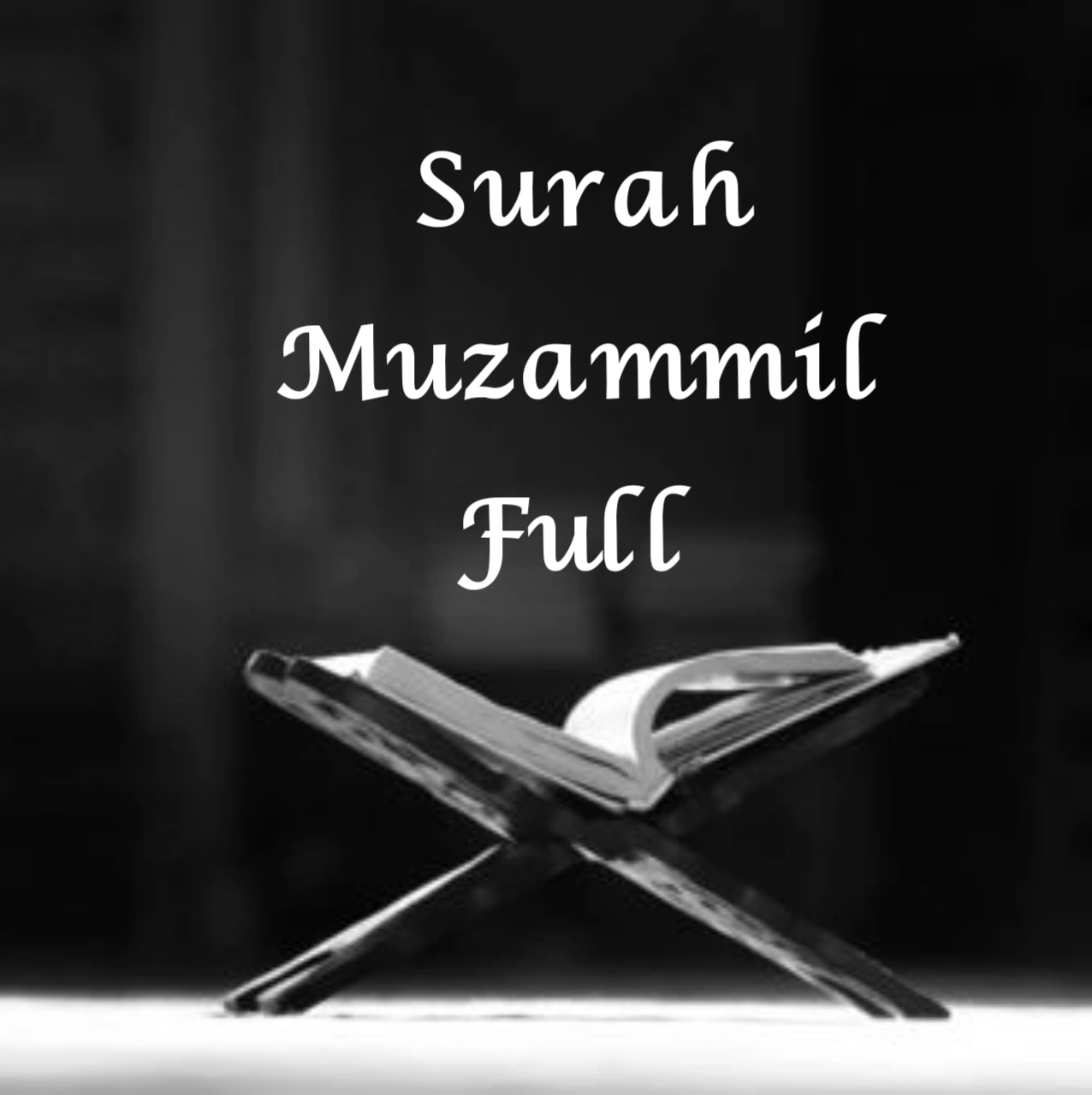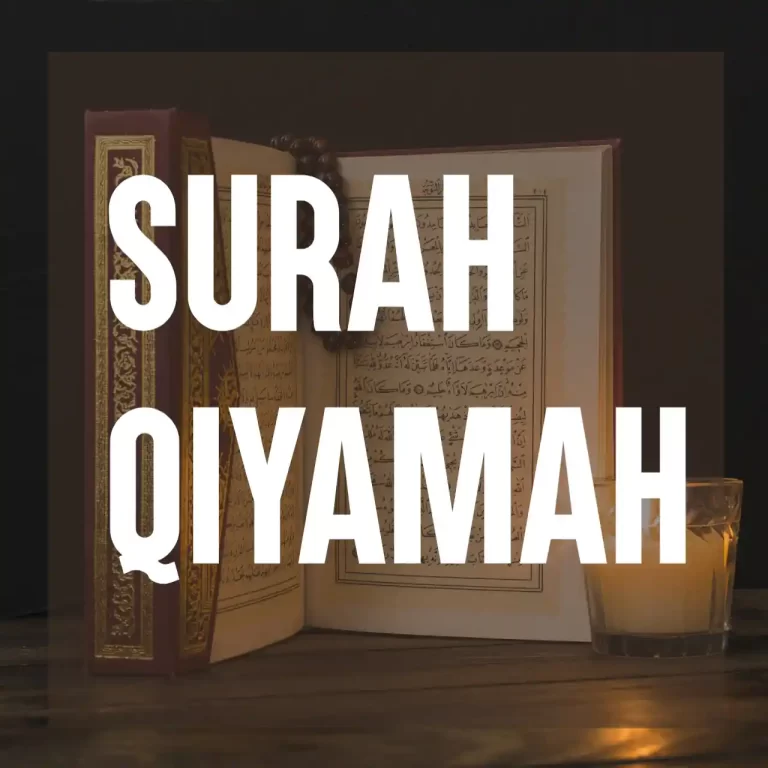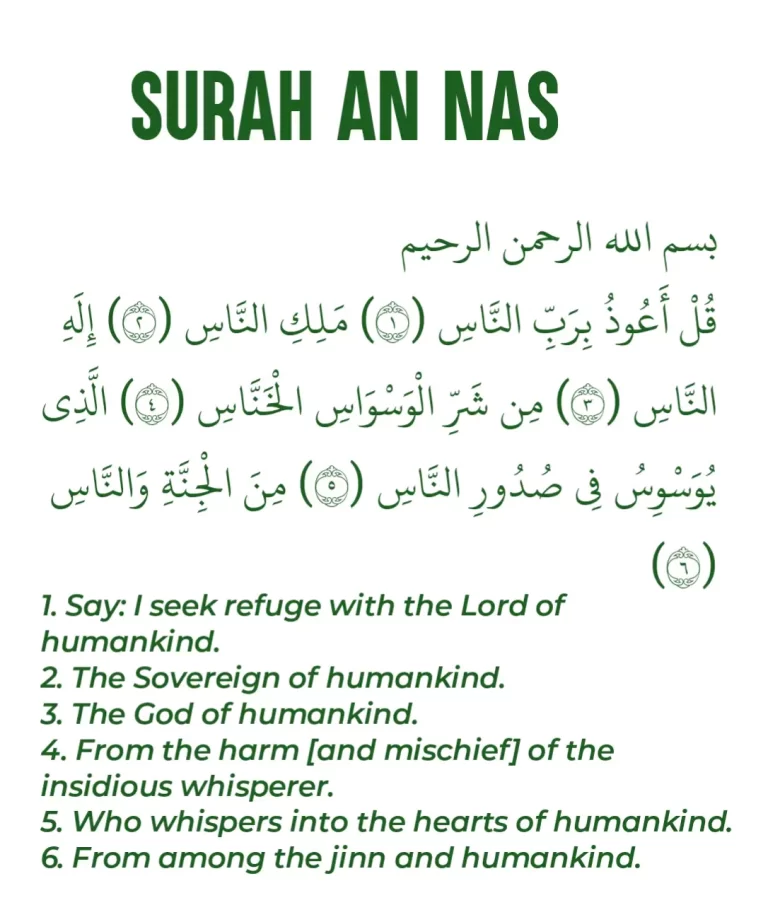Surah Muzammil Translation, Transliteration, Arabic, And Benefits In English
Surah Muzammil is the 73rd chapter of the Holy Qur’an and contains 20 verses or Aya. This surah takes its name from the reference to prophet Muhammad, in his cloak praying at night, in the opening verses of the chapter.
Advertisements
Summary of Surah Muzammil
| Classification | Meccan |
| Number of verses | 20 |
| Surah Before | Al-Jinn |
| Surah after | Al-Muddaththir |
| Other names | Bundled Up, Cloaked, The Mantled One, The Enwrapped One |
| Order | 73rd |
| Position | 29 juz |
Muzammil Surah In Arabic Text
بِسْمِ اللَّهِ الرَّحْمَٰنِ الرَّحِيمِ
- يَا أَيُّهَا الْمُزَّمِّلُ (١)
- قُمِ اللَّيْلَ إِلَّا قَلِيلًا (٢)
- نِصْفَهُ أَوِ انْقُصْ مِنْهُ قَلِيلًا (٣)
- أَوْ زِدْ عَلَيْهِ وَرَتِّلِ الْقُرْآنَ تَرْتِيلًا (٤)
- إِنَّا سَنُلْقِي عَلَيْكَ قَوْلًا ثَقِيلًا (٥)
- إِنَّ نَاشِئَةَ اللَّيْلِ هِيَ أَشَدُّ وَطْئًا وَأَقْوَمُ قِيلًا (٦)
- إِنَّ لَكَ فِي النَّهَارِ سَبْحًا طَوِيلًا (٧)
- وَاذْكُرِ اسْمَ رَبِّكَ وَتَبَتَّلْ إِلَيْهِ تَبْتِيلًا (٨)
- ؛رَبُّ الْمَشْرِقِ وَالْمَغْرِبِ لَا إِلَٰهَ إِلَّا هُوَ فَاتَّخِذْهُ وَكِيلًا (٩)
- وَاصْبِرْ عَلَىٰ مَا يَقُولُونَ وَاهْجُرْهُمْ هَجْرًا جَمِيلًا (١٠)
- وَذَرْنِي وَالْمُكَذِّبِينَ أُولِي النَّعْمَةِ وَمَهِّلْهُمْ قَلِيلًا (١١)
- إِنَّ لَدَيْنَا أَنْكَالًا وَجَحِيمًا (١٢)
- وَطَعَامًا ذَا غُصَّةٍ وَعَذَابًا أَلِيمًا (١٣)
- يَوْمَ تَرْجُفُ الْأَرْضُ وَالْجِبَالُ وَكَانَتِ الْجِبَالُ كَثِيبًا مَهِيلًا (١٤)
- إِنَّا أَرْسَلْنَا إِلَيْكُمْ رَسُولًا شَاهِدًا عَلَيْكُمْ كَمَا أَرْسَلْنَا إِلَىٰ فِرْعَوْنَ رَسُولًا (١٥)
- فَعَصَىٰ فِرْعَوْنُ الرَّسُولَ فَأَخَذْنَاهُ أَخْذًا وَبِيلًا (١٦)
- فَكَيْفَ تَتَّقُونَ إِنْ كَفَرْتُمْ يَوْمًا يَجْعَلُ الْوِلْدَانَ شِيبًا (١٧)
- السَّمَاءُ مُنْفَطِرٌ بِهِ ۚ كَانَ وَعْدُهُ مَفْعُولًا (١٨)
- إِنَّ هَٰذِهِ تَذْكِرَةٌ ۖ فَمَنْ شَاءَ اتَّخَذَ إِلَىٰ رَبِّهِ سَبِيلًا (١٩)
- إِنَّ رَبَّكَ يَعْلَمُ أَنَّكَ تَقُومُ أَدْنَىٰ مِنْ ثُلُثَيِ اللَّيْلِ وَنِصْفَهُ وَثُلُثَهُ وَطَائِفَةٌ مِنَ الَّذِينَ مَعَكَ ۚ وَاللَّهُ يُقَدِّرُ اللَّيْلَ وَالنَّهَارَ ۚ عَلِمَ أَنْ لَنْ تُحْصُوهُ فَتَابَ عَلَيْكُمْ ۖ فَاقْرَءُوا مَا تَيَسَّرَ مِنَ الْقُرْآنِ ۚ عَلِمَ أَنْ سَيَكُونُ مِنْكُمْ مَرْضَىٰ ۙ وَآخَرُونَ يَضْرِبُونَ فِي الْأَرْضِ يَبْتَغُونَ مِنْ فَضْلِ اللَّهِ ۙ وَآخَرُونَ يُقَاتِلُونَ فِي سَبِيلِ اللَّهِ ۖ فَاقْرَءُوا مَا تَيَسَّرَ مِنْهُ ۚ وَأَقِيمُوا الصَّلَاةَ وَآتُوا الزَّكَاةَ وَأَقْرِضُوا اللَّهَ قَرْضًا حَسَنًا ۚ وَمَا تُقَدِّمُوا لِأَنْفُسِكُمْ مِنْ خَيْرٍ تَجِدُوهُ عِنْدَ اللَّهِ هُوَ خَيْرًا وَأَعْظَمَ أَجْرًا ۚ وَاسْتَغْفِرُوا اللَّهَ ۖ إِنَّ اللَّهَ غَفُورٌ رَحِيمٌ (٢٠)
Transliteration/ Pronounciation
- Ya aiyuhal muzzammil
- Qumil laila illaa qaleelaa
- Nisfahooo awinqus minhu qaleelaa
- Aw zid ‘alaihi wa rattilil Qur’aana tarteela
- Innaa sanulqee ‘alaika qawlan saqeelaa
- Inn naashi’atal laili hiya ashadddu wat anw wa aqwamu qeelaa
- Inna laka fin nahaari sabhan taweelaa
- Wazkuris ma rabbika wa tabattal ilaihi tabteelaa
- Rabbul mashriqi wal maghriibi laaa ilaaha illaa Huwa fattakhizhu wakeelaa
- Wasbir ‘alaa maa yaqoo loona wahjurhum hajran jameelaa
- Wa zarnee walmukaz zibeena ulin na’mati wa mahhilhum qaleelaa
- Inna ladainaaa ankaalanw wa jaheemaa
- Wa ta’aaman zaa ghussa tinw wa’azaaban aleemaa
- Yawma tarjuful ardu waljibaalu wa kaanatil jibaalu kaseebam maheelaa
- Innaa arsalnaaa ilaikum rasoolan shaahidan ‘aleykum kamaaa arsalnaaa ilaa Fir’awna rasoolaa
- Fa’asaa Fir’awnur Rasoola fa akhaznaahu akhzanw wabeelaa
- Fakaifa tattaqoona in kafartum yawmany yaj’alul wildaana sheeba
- Assamaaa’u munfatirum bih; kaana wa’duhoo maf’oola
- Inna haazihee tazkiratun fa man shaaa’at takhaza ilaa Rabbihee sabeelaa
- 20. Inna Rabbaka ya’lamu annaka taqoomu adnaa min sulusa yil laili wa nisfahoo wa sulusahoo wa taaa’ifatum minal lazeena ma’ak; wal laahu yuqaddirul laila wanna haar; ‘alima al lan tuhsoohu fataaba ‘alaikum faqra’oo maa tayassara minal quraan; ‘alima an sa yakoonu minkum mardaa wa aakharoona yadriboona fil ardi yabtaghoona min fadlil laahi wa aakharoona yuqaatiloona fee sabeelil laahi faqra’oo ma tayassara minhu wa aqeemus salaata wa aatuz zakaata wa aqridul laaha qardan hasanaa; wa maa tuqaddimoo li anfusikum min khairin tajidoohu ‘indal laahi huwa khayranw wa a’zama ajraa; wastaghfirul laahaa innal laaha ghafoorur raheem.
Surah Muzammil Translation in English
Here is the complete translation of surah Muzammil in English.
- O you who are enwrapped [in garments].
- Stand up in prayer throughout the night, except a little.
- Half of it, or a little less than that.
- Or a little more; and recite the Qur’an at a measured pace.
- Verily We are going to send down to you words of surpassing gravity.
- Verily prayer at night is more appropriate for focus and more conducive to proper recitation.
- You have plenty of time during the day to attend to mundane matters.
- Constantly remember the name of your Lord, and devote yourself completely to Him.
- [He is] Lord of the east and the west; there is no god but He, so take Him as Disposer of your affairs.
- Bear patiently what they say and keep your distance from them in a dignified manner.
- Leave Me to deal with the deniers who are living a life of luxury and ease, and bear with them a little longer.
- Verily [awaiting them] with Us will be fetters and a blazing fire.
- And food that chokes, and a painful punishment.
- On the day when the earth and the mountains will shake violently, and the mountains will be like heaps of loose sand.
- Verily We have sent to you a Messenger to be a witness over you, as We sent to Pharaoh a Messenger.
- But Pharaoh disobeyed the Messenger, so We seized him with a terrible punishment.
- How will you protect yourselves, if you persist in disbelief, against [the punishment of] a day which will turn the children’s hair grey.
- On which the heaven will be rent asunder? His promise will surely be fulfilled.
- Verily this is a reminder; so let him who will, start his journey towards his Lord.
- Verily your Lord knows that you stand up in prayer a little less than two-thirds of the night, or half of it, or one-third of it, as do others among your Companions. Allah alone keeps a precise count of the night and day; He knows that you are not able to keep an accurate count of it, so He has pardoned you. Recite, then, as much of the Qur’an as is easy for you [in the night prayers]. He knows that there are some among you who are ill, and others who are travelling through the land, seeking of Allah’s bounty, and others who are fighting in Allah’s cause. So recite as much of the Qur’an as is easy for you; establish prayer and give zakah; and lend to Allah a goodly loan. Whatever good you send forth for your souls you will find it with Allah, better and greater in reward. And seek Allah’s forgiveness, for verily Allah is Oft-Forgiving, Most Merciful.
Surah Muzammil Full Picture
Here are the full pictures of this surah.


Commentary/ Explanation of Muzammil Surah
The one who is enwrapped in garments is the one who is covered with them. The name of this soorah (al-Muzzammil) conveys the same meaning as the name as the one that follows it (al-Muddath thir).
Advertisements
This describes what the Messenger of Allah SAW did when Allah honoured him with His message and began to send down His revelation to him via Jibreel.
He saw something the like of which he had never seen, and no one could withstand it except the Messengers, so in the beginning it was something that was deeply shocking to him, when he first saw Jibreel.
Therefore he came to his family, deeply shaken, and said: Wrap me up, wrap me up. (Bukhari)
Jibreel came to him and said: iqra (Read)! He said: I am not a reader. (Bukhari and Muslim)
Then Jibreel embraced him and pressed him to the point that he felt he could not take it anymore, and the angel was insisting that he read, then he began to recite.
Advertisements
Then Allah made him steadfast, and the revelations started coming frequently, until he attained a level that none of the Messengers before him attained.
Subhan Allah, how great is the difference between the beginning and end of prophethood.
Hence Allah addressed him in these terms, as he was at the beginning, when the revelation began.
Advertisements
Allah instructed him to do some acts of worship that were only for him to do, then He instructed him to bear patiently the harm done by his enemies, then He instructed him to carry out His command and call people openly to Allah.
Here Allah enjoins upon him the noblest act of worship, namely prayer, and commands him to do it at the best and most virtuous of times, which is at night.
By His mercy, Allah did not command him to spend the entire night in prayer; rather He said: ((stand up in prayer throughout the night, except a little)).
Then He gives an estimate of the length of time: ((half of it, or a little less than that)) that is, less than half, such as one-third and the like ((or a little more)) that is, a little more than half, such as two-thirds and the like.
And recite the Qur’an at a measured pace)) for reciting it at a measured pace facilitates reflection, has a greater impact on the heart, and enables one to worship Allah by reciting its verses, with complete focus.
Surah Muzammil Benefits
Allah mentions the wisdom behind the command to pray at night:
Verily prayer at night after having slept is more appropriate for focus and more conducive to proper recitation that is, it is more likely to achieve the purpose of the Qur’an when one focuses fully on what one is reciting, for there are few distractions at night, so one will be able to focus and understand the words one recites.
Because Allah commanded him to pray in particular, and to remember Him in general terms, that enabled him to develop steadfastness that helped him to bear burdens and do difficult tasks.
Allah commanded him to bear with patience the words and insults of the stubborn rejecters who reviled him and the message he brought, and to persist in carrying out the commands of Allah, not letting anyone stop him or deter him.
He also commanded him to keep his distance in a dignified manner when it was appropriate to do so, and to keep a distance without causing any offence.
So he was to respond to them by keeping a distance from them, turning away from them and paying no heed to their offensive talk.
Yet at the same time Allah commanded him to debate with them in the best manner.
(Recite, then, as much of the Qur’an as is easy for you [in the night prayers]) that is, of what you know and what is not difficult for you.
That is because the one who prays at night is enjoined to pray so long as he has energy.
Then if he feels tired or lazy, or becomes drowsy, let him rest so that he can offer the prayer with ease and in comfort.
Then Allah mentions some of the reasons that dictated reducing the burden and making things easier, as He says:
(He knows that there are some among you who are ill) so it is difficult for them to pray for two-thirds of the night, or for half of it, or one-third.
So let the one who is sick pray what he can.
He is also not required to pray standing, if it is too difficult for him; rather if it is too difficult for him to offer the supererogatory prayer, he may omit it, and he will have the reward of what he used to do when he was healthy.
And others who are travelling through the land, seeking of Allah’s bounty) that is, Allah knows that among you are some who are travelling for the purpose of trade, so that they may be independent of means and refrain from asking of people.
It is appropriate that such people should not be overburdened, therefore Allah has reduced the obligatory prayer for them, by permitting them to put two prayers together at the time of one of the prayers and to shorten the four rak ‘ah prayers.
Similarly, there are also pothers who are fighting in Allah’s cause.
So recite as much of the Qur’an as is easy for you.
Allah mentions two ways of making things easier for the one who is healthy and is not travelling, where attention is paid to his energy level, without burdening him with the issue of working out the exact length of time; rather he may work out the time when praying is best, which is the third of the night that follows the first half.
And things are made easier for the one who is sick or travelling, whether his travel is for the purpose of trade or worship, such as fighting, jihad, Hajj, ‘umrah and the like.
Attention is also paid to not overburdening people in these situations.
To Allah be praise, for He has not made any hardship in religion; rather He has made His religion easy and has paid attention to the circumstances of His slaves and that which is in their best spiritual, physical and worldly interests.
Then Allah enjoins two acts of worship, which are the essence and foundation of all acts of worship: establishing prayer, without which religion cannot be sound, and paying zakah, which is the proof of faith, by means of which help is given to the poor and needy.
Hence Allah says: establish prayer) with all its essential parts, fulfilling its necessary conditions and doing the complementary parts too.
And give zakah; and lend to Allah a goodly loan) that is, one that is given sincerely for the sake of Allah, with a sincere intention and strong faith, and from permissible sources.
This includes both obligatory and recommended kinds of charity.
Then Allah urges us to do good in general terms, as He says:
(Whatever good you send forth for your souls you will find it with Allah, better and greater in reward)).
A good deed brings a tenfold reward, up to seven hundredfold, up to many times more.
It should be noted that an atom’s weight of good in this world is many times better than this world and all that it contains, because of what it will lead to in paradise of pleasures and delights.
Goodness and righteousness in this world will be the cause of goodness and immense reward in the hereafter, for that is the seed, basis and foundation of goodness in the hereafter.
How regrettable is time spent in heedlessness, and how regrettable is time spent without doing any righteous deeds.
How regrettable it is to see hearts that are not affected by the exhortation of their Creator, and for whom all the encouragement of the One Who is more merciful to them than they are to themselves is to no avail.
To You be praise, O Allah; to You we complain, and Your help we seek.
There is no power and no strength except in You.
And seek Allah’s forgiveness, for verily Allah is Oft-Forgiving, Most Merciful).
In the command to seek forgiveness after urging people to do good deeds there is a great deal of benefit.
That is because the human being will inevitably fall short with regard to that which is enjoined upon him, either because he does not do it at all, or because he does it imperfectly.
So Allah has commanded us to make up for that by seeking forgiveness.
The individual commits sin night and day, and if Allah does not bestow His mercy and forgiveness upon him, he will be doomed.
This is the end of the commentary on Soorat al-Muzzammil. All praise and thanks are for Allah, and may the blessings and peace of Allah be upon Prophet Muhammad, his family, and his Companions abundantly until the Day of Judgement.
Related reading 4 Qul Surah In English (Best Translation And Benefits)
Advertisements








2 Comments